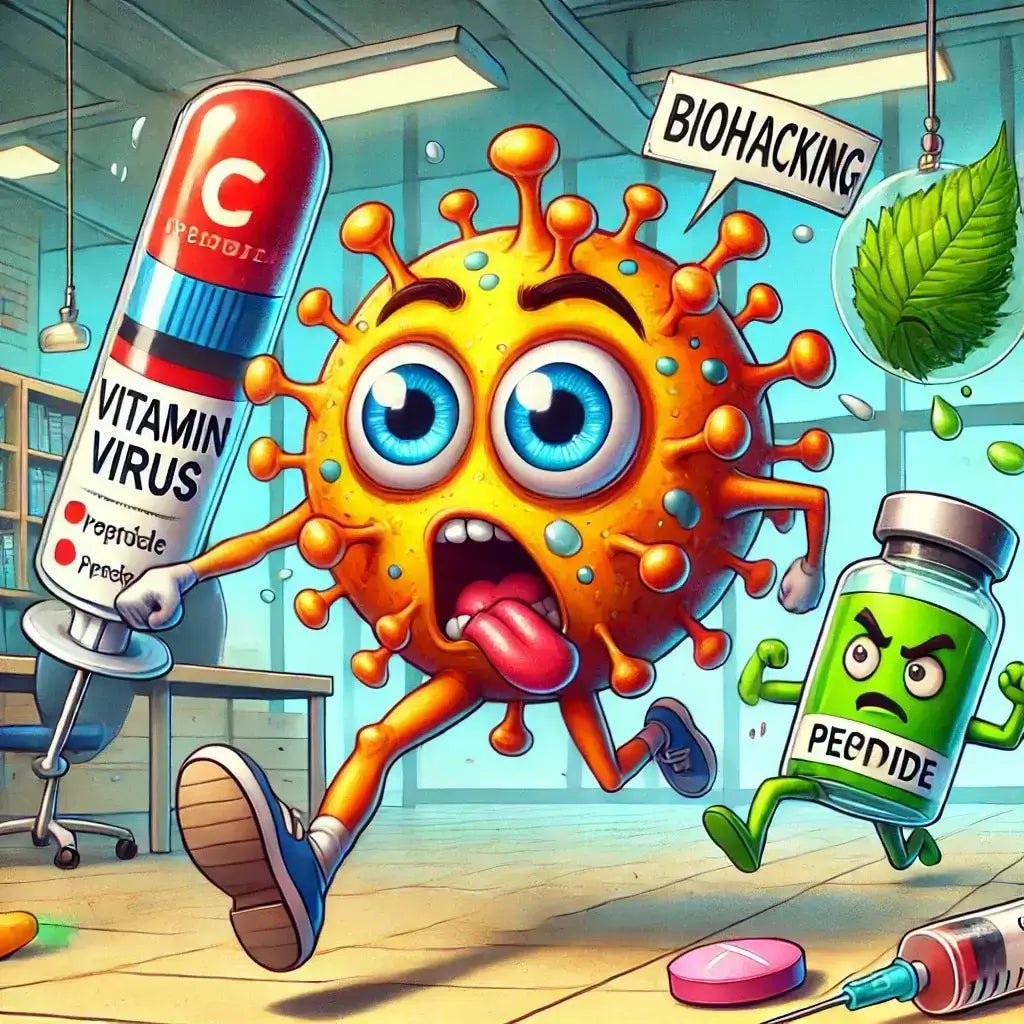Comprehensive Guide to Managing Herpes Outbreaks: Peptides, Supplements & Lifestyle Support

Effective Strategies for Herpes Outbreak Management and Relief
Experiencing a herpes outbreak can be painful and challenging. But with the right strategies, from antiviral medications and antiviral treatment to immune-boosting peptides, lifestyle changes, and natural supplements, you can better manage symptoms, shorten outbreaks, and reduce recurrence. This guide covers effective strategies for herpes outbreak relief and gives an overview of both mainstream and alternative treatment options.
Understanding Herpes
Herpes is a viral infection caused by two types of viruses: Herpes Simplex Virus Type 1 (HSV-1), commonly known as oral herpes, and Herpes Simplex Virus Type 2 (HSV-2), typically linked to genital herpes. HSV-2, a herpes virus, remains in the body and can become active from time to time, often causing sores and other uncomfortable symptoms.
Identifying Herpes Symptoms
Common symptoms of a herpes outbreak include pain, itching, and herpes sores on the skin, often on or around the mouth or genitals. The first outbreak tends to be the most intense, and future outbreaks (recurrent herpes) may have mild symptoms happen less frequently over time, though they can still be painful and disruptive.
Genital Herpes Symptoms
Genital herpes can cause painful sores and inflammation around the genital area. It can also cause flu-like symptoms such as fever, body aches, and swollen lymph nodes. Symptoms typically last 2–4 weeks during an outbreak, with treatments available to manage the discomfort, relieve pain, and speed healing.
Individuals with genital herpes have a higher risk of contracting or transmitting HIV infection due to breaks in the skin caused by herpes sores.
Managing Herpes Outbreaks
Managing herpes outbreaks and HSV infection involves a combination of antiviral medication, immune support, topical treatments, and sometimes lifestyle changes. Knowing the triggers—like stress, illness, and dietary habits—can help reduce the number and intensity of outbreaks.
Home Remedies and Lifestyle Changes
Lifestyle choices can help manage outbreaks and reduce frequency:
Healthy Diet: Eating foods rich in vitamins, antioxidants, and minerals can strengthen the immune system.
Stress Reduction: Stress is a major trigger for herpes outbreaks, so relaxation techniques like meditation, exercise, and adequate sleep can make a big difference.
Hydration: Drinking plenty of water supports immune health and helps the body heal.
Use protective barriers like condoms and dental dams during oral sex to reduce the risk of transmission.
Prescription Herpes Medicine
Doctors commonly prescribe antiviral drugs to treat herpes infection. These medications are most effective when taken as soon as symptoms appear, as they limit the virus’s ability to replicate and can reduce the duration and severity of outbreaks.
Antiviral Drugs for Herpes
Antiviral medications are the standard antiviral treatment for herpes. Two widely used options are:
Valacyclovir: Often prescribed at 1,000 mg twice daily for 5–10 days, this medication is a popular choice for reducing the length and severity of outbreaks.
Famciclovir: Taken at 500 mg twice daily for 5–10 days, famciclovir is another option, often used when valacyclovir is unavailable or unsuitable for the patient.
Recurrent Genital Herpes
For people with recurrent or genital herpes infections, regular antiviral medication can help. Many find that low doses taken daily or “as-needed” doses at the first sign of an outbreak can greatly reduce outbreak frequency and intensity. Talking with a doctor about these options can help find the best plan.
Similarly, recurrent oral and herpes infections can be managed with regular antiviral medication to reduce the frequency and intensity of outbreaks.
Complementary and Alternative Medicine (CAM)
CAM therapies can support conventional treatments. Integrative approaches, including immune-boosting supplements and peptides, may help the body fight off the virus and support quicker healing.
Alternative therapies can also be effective in managing cold sores, which are blisters that form around the lips and mouth due to the herpes simplex virus.
Peptides for Immune Support
Peptides are small protein fragments that help the immune system function better. Though they don’t directly kill the virus, they can help the body respond faster to outbreaks and heal herpes sores more quickly:
Thymosin Alpha-1 (TA1): An immune-boosting peptide, TA1 is typically taken as a 1.6 mg injection daily during outbreaks to support T-cell activity.
Thymulin: Taken at 5–10 mg daily, thymulin helps reduce inflammation and boosts immune system balance. This peptide works best with adequate zinc intake.
BPC-157: Used for healing, BPC-157 reduces inflammation and helps lesions heal faster when taken at 250 mcg twice daily.
Alternative Therapies for Herpes
Many people turn to alternative therapies to manage oral or genital herpes symptoms. These options, while not cures, can be helpful additions:
LL-37 Gel or Cream: An antimicrobial peptide, LL-37 can be applied to sores 2–3 times daily to reduce viral activity and help heal.
Docosanol Cream (Abreva): Available over the counter, this cream helps prevent the virus from spreading to nearby cells, reducing the spread and discomfort of outbreaks.
Oral Herpes Management
Oral herpes (HSV-1) often causes cold sores around the mouth. Antiviral creams, ointments, and medications can help manage these outbreaks. Applying treatments like docosanol cream directly on sores can prevent further spread genital infection and help sores heal faster.
Herpes Prevention
Preventing herpes outbreaks can sometimes be challenging, as the herpes virus lies dormant in the body. However, staying healthy, reducing stress, and maintaining a strong immune system can reduce the number and severity of outbreaks and spreading herpes further.
Living with Herpes
Living with herpes is about finding ways to manage the HSV infection and minimize outbreaks. Many people find that a combination of antiviral medication, lifestyle changes, and supportive therapies helps keep symptoms under control. Over time, outbreaks may decrease, making the virus easier to manage.
Psychological Impact of Herpes
Living with herpes can have a significant psychological impact. The stigma associated with herpes often leads to feelings of shame, guilt, and anxiety. Many individuals experience depression, low self-esteem, and social isolation. It’s crucial to remember that herpes is a common condition, and many people live with it without any significant issues.
Herpes can also affect relationships, as individuals may feel hesitant to disclose their condition to their partners. This can lead to feelings of loneliness and disconnection. However, with proper treatment and support, individuals with herpes can manage their condition and maintain healthy relationships. Seeking support from friends, family, or a mental health professional can be beneficial in coping with the emotional challenges of living with herpes.
Herpes and Relationships
Herpes can have a significant impact on relationships, particularly if not managed properly. It’s essential to disclose your herpes status to your partner before engaging in any sexual activity. This can help prevent the transmission of the virus and build trust in the relationship.
Using condoms and practicing safe sex can reduce the risk of transmission. However, even with proper precautions, herpes can still be transmitted. Open and honest communication with your partner about your herpes status genital symptoms, and any concerns you may have is crucial. Many couples find that discussing herpes openly strengthens their relationship and helps them navigate the challenges together.
Herpes Diagnosis
A healthcare provider can diagnose a herpes infection through a physical exam, a swab of a sore, or a blood test. Early diagnosis allows for better management, so seeing a doctor at the first sign of sores or other symptoms is essential.
Nutritional Support for Herpes Management
While there is no cure for herpes, nutritional support can play a vital role in managing the condition. A healthy diet rich in fruits, vegetables, and whole grains can help boost the immune system and reduce the severity of outbreaks.
Some foods that may help manage herpes include:
L-lysine: An amino acid that can help reduce the severity of outbreaks.
Vitamin C: An antioxidant that can help boost the immune system.
Zinc: A mineral that can help reduce the severity of outbreaks.
Omega-3 fatty acids: Anti-inflammatory fatty acids that can help reduce inflammation.
Avoiding foods that trigger outbreaks, such as citrus fruits and spicy foods, can also help manage the condition. Incorporating these dietary changes can support overall sexual health, and potentially reduce the frequency and intensity of herpes outbreaks.
Herpes in Pregnancy
Herpes can be a concern during pregnancy, particularly if the mother has a history of genital herpes. The risk of transmission to the baby is highest during vaginal delivery, especially if the mother has an active active herpes outbreak there.
To reduce the risk of transmission, women with genital herpes should:
Inform their healthcare provider of their herpes status.
Take antiviral medication during pregnancy to reduce the risk of transmission.
Avoid vaginal delivery if they have an active outbreak.
Consider a cesarean delivery if they have a history of genital herpes.
By working closely with their healthcare provider, pregnant women with genital herpes can take steps to protect their baby and ensure a healthy pregnancy.
Herpes Myths and Misconceptions
There are many myths and misconceptions surrounding herpes. Here are a few:
Herpes is not a sign of poor hygiene or poor health: Herpes is a viral infection that can affect anyone, regardless of their hygiene or health status.
Herpes is not a death sentence: It’s a manageable condition with proper treatment and lifestyle adjustments.
Herpes is not contagious through casual contact: The virus is not spread through touching, hugging, or sharing utensils.
Herpes is not a reflection of a person’s moral character: Contracting herpes is not related to a person’s morals or character.
Herpes is not a guarantee of transmission: With proper precautions, the risk of transmission can be significantly reduced.
By educating ourselves and others about herpes, we can reduce the stigma associated with the condition and promote a more supportive and understanding environment for those living with herpes.
Putting It All Together: A Complete Treatment Plan
To make managing outbreaks easier, here’s a quick plan that combines antiviral treatment, medications, peptides, topicals, and supplements:
Treatment |
Dosage |
|---|---|
Antiviral Medication |
Valacyclovir (1,000 mg) or Famciclovir (500 mg) twice daily for 5–10 days |
Immune-Boosting Peptides |
Thymosin Alpha-1 (1.6 mg daily), Thymulin (5–10 mg daily), BPC-157 (250 mcg twice daily) |
Topical Treatments |
LL-37 Gel/Cream or Docosanol Cream applied 2–3 times daily on sores |
Supplement Support |
Vitamin C (1,000 mg twice daily), L-Lysine (1,000 mg three times daily), Zinc Lozenges (15–25 mg per lozenge up to 4 times daily) |
FAQs About Herpes Treatment
Can peptides cure herpes? No, peptides don’t cure the herpes virus, but they help support your immune system.
How do antiviral drugs help? Antivirals limit the virus’s ability to replicate, reducing symptoms and shortening outbreaks.
Do supplements reduce outbreaks? Some, like L-Lysine and Vitamin C, can strengthen the immune system, possibly reducing a genital herpes outbreak severity.
Does zinc help with herpes? Zinc supports immune health and helps thymulin work better, boosting the immune system’s response.
Is LL-37 cream easy to find? LL-37 is typically found through specialized providers and may require a prescription.
How long should I take supplements? Usually, they’re taken during outbreaks, but it’s best to ask a healthcare provider.
Final Thoughts
A balanced plan combining antiviral medications, immune-support peptides, topical remedies, and supplements can make a big difference in managing the herpes virus. Always work with your healthcare provider to create a treatment plan that works for you.
